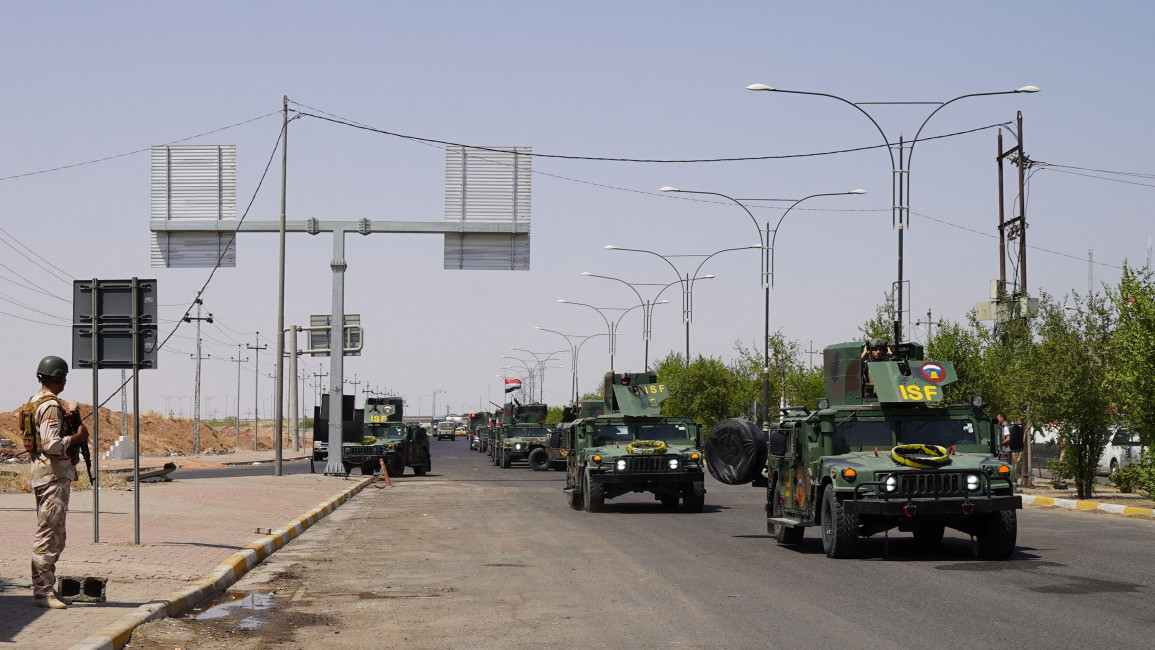US State Department urges resolution to tensions in Kirkuk between Iraq and KRG
The US State Department has urged Iraqi and Kurdish authorities to seek resolution through dialogue and uphold Iraq's constitution in the face of escalating tensions in Kirkuk, resulting in multiple casualties.
On 3 September, four Kurds died, with 15 others injured in Kirkuk—a disputed province caught between Iraq's federal government and the Kurdistan Regional Government (KRG). Turmoil erupted when Iraqi security forces attempted to disperse irate Kurdish demonstrators demanding the reopening of the Kirkuk-Erbil highway, blocked for nearly a week by Iraq's Popular Mobilisation Forces (PMF) and their supporters.
"We're closely monitoring the tensions in Kirkuk. We condemn the violence that took place and express our condolences to the families of those killed," Vedant Patel, Principal Deputy Spokesperson of the US State Department, told reporters in a press conference on Tuesday, 5 September. "The US calls on all parties to resolve any disputes through dialogue and through the activation of Article 140 of the Iraqi constitution."
On Thursday, Iraq's Chief of Staff of Armed Forces, Lieutenant General Abdul Amir Yarallah and the commander of the ground forces, Lieutenant General Qassem Al-Mohammadi, arrived in Kirkuk to supervise security arrangements in the wake of expected protests in front of Kirkuk's citadel, Iraq's state media reported.
Iraqi authorities deployed intensive security in front of Kirkuk's citadel to thwart any attempts to hold fresh demonstrations by the Kurds.
Iraq's 2005 permanent constitution, specifically Article 140, delineates a framework for resolving the status of constitutionally contested regions, notably Kirkuk, known for its oil wealth, caught in the crosshairs of the Iraqi federal government and the KRG.
Iraqi authorities deployed a large military force around Kirkuk Castle and its surroundings to prevent any potential demonstrations or gatherings. pic.twitter.com/YjDpfKpfIN
— Kendal Amanos - KurdishFront (@AmanosKendal) September 7, 2023
These provisions encompass normalisation efforts, a census, and a referendum to determine whether these areas will remain under Iraqi government authority or join the northern Kurdish region.
Crucially, Article 140 sets a clear deadline for the referendum, not later than 31 December 2007. Unfortunately, despite this mandate, the vote remains unimplemented to this day.
The unrest stemmed from the demand of Arab and Turkmen communities in Kirkuk, particularly those affiliated with the Iran-backed Asaib Ahl-Haq militia. They called upon Iraq's Prime Minister, Mohammed Shia' al-Sudani, to revoke his directive instructing the Iraqi military's Joint Operations Command (JOC) to transfer their headquarters, situated in the predominantly Kurdish-populated Shoraw neighbourhood, to the Kurdistan Democratic Party (KDP).
The protestors then blocked the Kirkuk-Erbil highway and established sit-in tents, which caused inconvenience and traffic jams for drivers and nearby Kurdish-populated neighbourhoods, mainly in the Shoraw sector.
In 2014, Kurdish forces successfully wrested control of Kirkuk from the Islamic State.
The building, formerly housing the KDP headquarters, came under Iraqi army control in October 2017. This occurred following the expulsion of Kurdish peshmerga forces from the city, a response to the controversial Kurdish independence referendum for independence from Iraq held on 25 September 2017.
Kurds from Kirkuk held a counter-demonstration to call for local authorities to open the highway, saying the blockage has negatively impacted their businesses.
Soon after, the protest turned violent. as the Kurdish demonstrators headed towards the tents of the Arab protestors installed in front of the JOC building.
Consequently, four Kurds were killed reportedly by the gunfire from Iraq's security forces.
Following the deadly incident, Sudani ordered the formation of a fact-finding committee to investigate the incidents in Kirkuk and take legal actions against "those found to be negligent" and "creating chaos in the city".
Locals of Kirkuk have told local media that the authorities have arrested tens of Kurds for participating in the demonstrations but did not take any legal actions against those who blocked the highway.
Massoud Mullah Parwez, head of relations at the KDP's branch in Kirkuk, late in August, told The New Arab that the party's return to "their occupied headquarters" is based on the previous agreements between the KDP and other allies in the Coalition for the Administration of the State, that backed Mohammed Shia al-Sudani to form his cabinet in October 2022.
He also claimed that the protestors aim to "create chaos" in the city before the upcoming provincial elections in Iraq scheduled for 18 November.
For the first time since 2005, provincial elections will also be held in Kirkuk.
He said their expected return to Kirkuk would also include the return of security and peshmerga forces affiliated with the KDP and the KRG.
Arab and Turkmen protesters have argued that "the KDP had kidnapped and killed" residents from Kirkuk in the JOC building, claiming that the ownership of the land on which the KDP has built the headquarters belongs to the Iraqi state.
They also claimed that the whereabouts of hundreds of Iraqis, reportedly kidnapped by the ruling Kurdish parties in Kirkuk, are still unknown.



